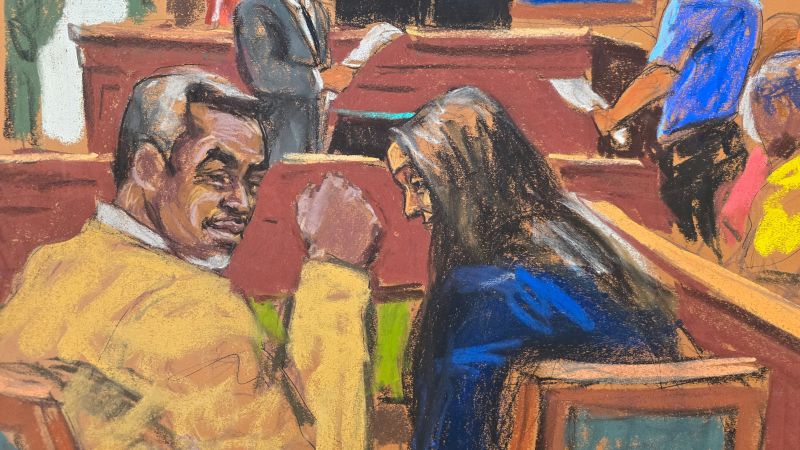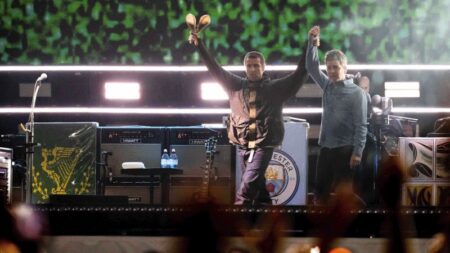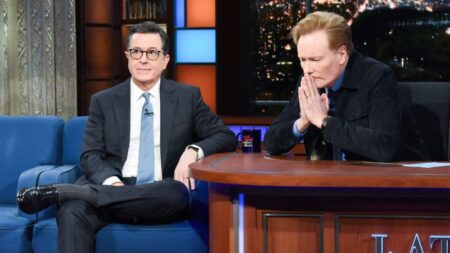Sean “Diddy” Combs, a prominent figure in the hip-hop industry, has recently faced a tumultuous experience within the federal court system which culminated in a verdict that granted him a significant reprieve. After enduring a grueling trial concerning serious allegations against him, Combs was found not guilty on the most severe charges brought forth by the prosecution. The moment he heard the verdict, the gravity of the situation seemed to wash over him, as he fell to his knees, clasped his hands together in prayer, and bowed his head. This moment, brimming with relief, symbolized a second chance at life for the music mogul.
In the courtroom, located on the 26th floor of a federal courthouse in lower Manhattan, Combs demonstrated profound gratitude towards the jury. He turned towards them with his palms in prayer and nodded appreciatively after hearing their decision. Awaiting him outside the courtroom were rows of supporters, including his mother, sister, six adult children, and a host of friends, all of whom erupted into applause as he was led away. This united front of supporters highlighted the personal stakes involved in the jury’s decision.
The crux of the trial revolved around allegations that Combs had orchestrated a criminal enterprise aimed at facilitating his sexual desires through coercive and corrupt practices. He faced the grim possibility of life imprisonment if convicted of racketeering conspiracy and sex trafficking—charges related to two former girlfriends, Cassie Ventura and a woman identified as Jane. Ultimately, while he was convicted on lesser counts, the jury acquitted him of the more severe charges after deliberating for a total of 13 hours, following a trial that spanned over six weeks.
The prosecution’s arguments proposed a case that included an array of evidence, ranging from text messages to sexually explicit videos, all cobbling together a narrative of coercion and abuse. Nonetheless, the jury’s decision signified a rejection of this narrative. Witness testimonies varied widely in demeanor, showcasing emotional recounting as well as moments of levity; Combs’ former stylist, Deonte Nash, for instance, provided comic relief in contrast to the heavy mood permeating the courtroom. The trial also featured notable figures, such as rapper Kid Cudi, who brought an air of drama not just through his testimony about his personal connection to Ventura, but also through his casual attire—a leather jacket complemented by a cigarette.
Combs, who played a significant role in orchestrating his defense despite not taking the stand himself, employed a formidable team of attorneys, including Marc Agnifilo and Teny Geragos. The defense’s strategy drew laughter during closing arguments, as Agnifilo ridiculed elements of the prosecution’s case, using the seizure of baby oil as comedic fodder. His mockery of the evidence brought levity to an otherwise serious and weighty matter, momentarily lightening the atmosphere in the courtroom.
Throughout the trial, Judge Arun Subramanian maintained an active and structured courtroom schedule, establishing strict parameters for the proceedings. Observers noted the unusual harmony of the jurors, alternating between rapt attention during crucial testimonies and moments of rest during prolonged repetitions of evidence. The jury’s dynamic would ultimately lead them to a resolution, affirming Combs’ innocence on the more severe indictments.
Following the pronouncement of the verdict, the dynamics shifted again—prosecutors exited while Combs’ defense team celebrated. Supporters outside the courthouse expressed their relief and camaraderie, with some engaging in playful antics, such as spraying baby oil in celebration—a fitting nod to one of the trial’s more absurd focal points. As reporters captured the aftermath, themes of resilience and loyalty echoed throughout the crowd.
In the end, Sean Combs’ trial was a vivid reminder of the complexities of fame, relationships, and justice, filled with stark evidence, emotional testimonies, and a vivid public spectacle surrounding the hip-hop mogul. This chapter of his life may have closed with a collective sigh of relief from his supporters, but the intricate threads of legal narratives, celebrity culture, and personal relationships will likely resonate for years to come.











